Detailed Report: Analysis of the CVE-2008-4250 Windows Vulnerability
VerifiedAdded on 2019/09/19
|5
|927
|426
Report
AI Summary
This report provides a comprehensive analysis of the CVE-2008-4250 vulnerability affecting Microsoft Windows XP, Server 2003, and 2000 operating systems. The vulnerability, a remote code execution flaw, is triggered by a stack-based buffer overflow in the RPC service, specifically within the 'NetPathCanonicalize()' function of the 'netapi32.dll' file. The report details the technical description, attack vectors involving SMB connections via ports 445 and 139, and exploitation scenarios. It outlines mitigation strategies such as applying system patches, implementing intrusion detection systems, and following firewall best practices. Furthermore, the report suggests remediation steps, including upgrading to newer Windows versions, disabling the computer browser server service, blocking RPC UUIDs, and blocking specific TCP ports. The report also references the Conficker virus, which exploited this vulnerability, highlighting its potential for widespread automated exploits.
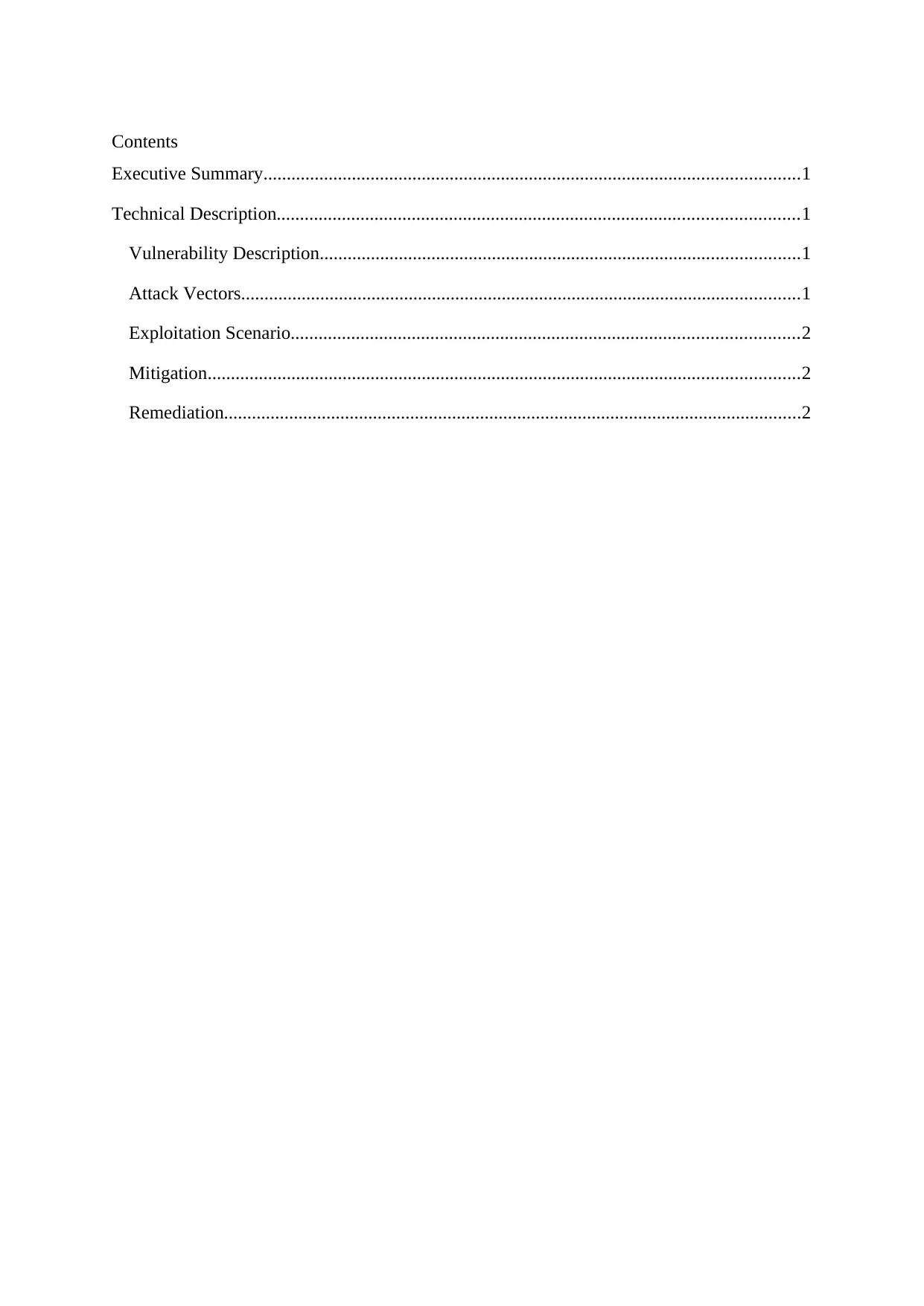
Contents
Executive Summary...................................................................................................................1
Technical Description................................................................................................................1
Vulnerability Description.......................................................................................................1
Attack Vectors........................................................................................................................1
Exploitation Scenario.............................................................................................................2
Mitigation...............................................................................................................................2
Remediation............................................................................................................................2
Executive Summary...................................................................................................................1
Technical Description................................................................................................................1
Vulnerability Description.......................................................................................................1
Attack Vectors........................................................................................................................1
Exploitation Scenario.............................................................................................................2
Mitigation...............................................................................................................................2
Remediation............................................................................................................................2
Paraphrase This Document
Need a fresh take? Get an instant paraphrase of this document with our AI Paraphraser
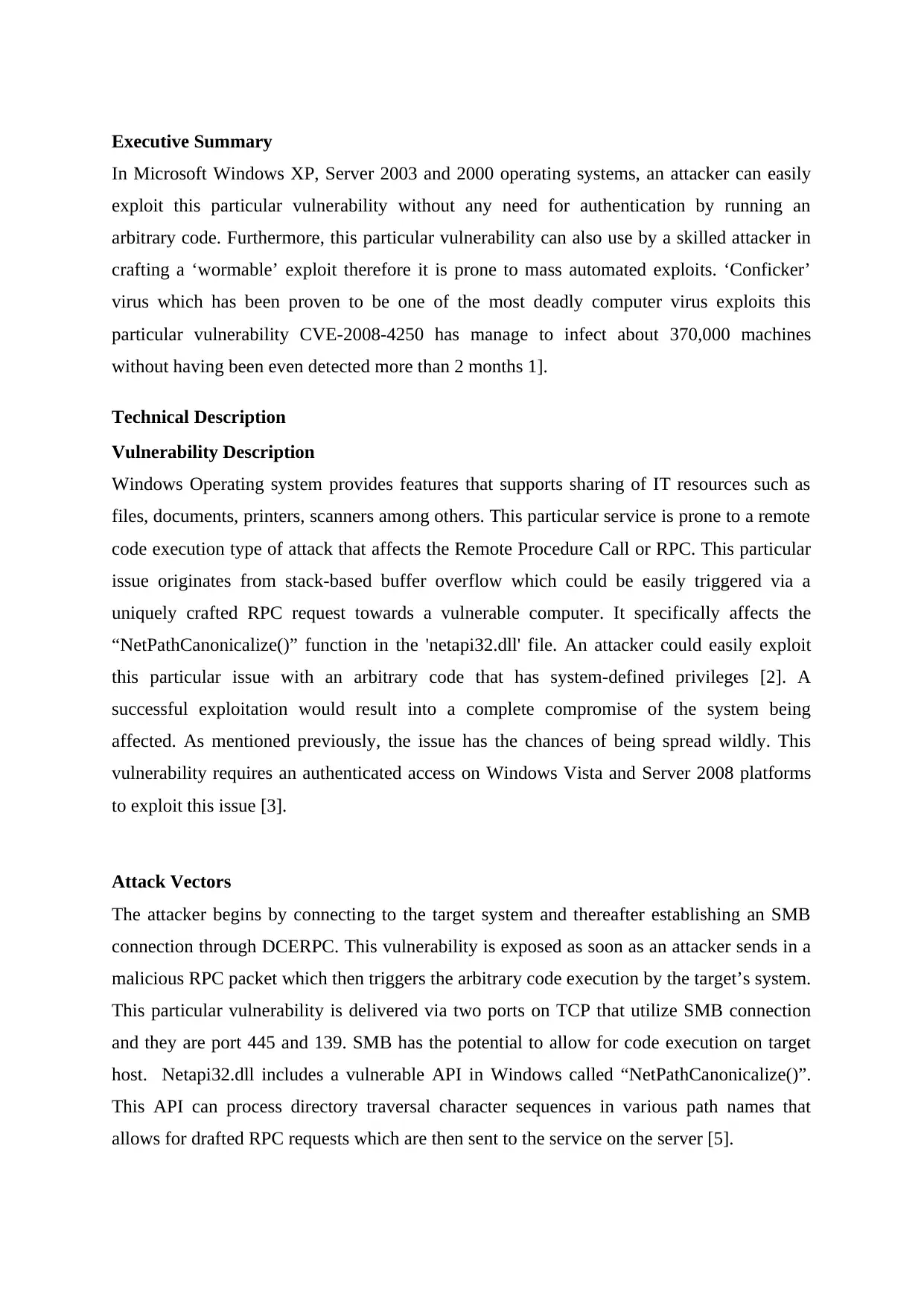
Executive Summary
In Microsoft Windows XP, Server 2003 and 2000 operating systems, an attacker can easily
exploit this particular vulnerability without any need for authentication by running an
arbitrary code. Furthermore, this particular vulnerability can also use by a skilled attacker in
crafting a ‘wormable’ exploit therefore it is prone to mass automated exploits. ‘Conficker’
virus which has been proven to be one of the most deadly computer virus exploits this
particular vulnerability CVE-2008-4250 has manage to infect about 370,000 machines
without having been even detected more than 2 months 1].
Technical Description
Vulnerability Description
Windows Operating system provides features that supports sharing of IT resources such as
files, documents, printers, scanners among others. This particular service is prone to a remote
code execution type of attack that affects the Remote Procedure Call or RPC. This particular
issue originates from stack-based buffer overflow which could be easily triggered via a
uniquely crafted RPC request towards a vulnerable computer. It specifically affects the
“NetPathCanonicalize()” function in the 'netapi32.dll' file. An attacker could easily exploit
this particular issue with an arbitrary code that has system-defined privileges [2]. A
successful exploitation would result into a complete compromise of the system being
affected. As mentioned previously, the issue has the chances of being spread wildly. This
vulnerability requires an authenticated access on Windows Vista and Server 2008 platforms
to exploit this issue [3].
Attack Vectors
The attacker begins by connecting to the target system and thereafter establishing an SMB
connection through DCERPC. This vulnerability is exposed as soon as an attacker sends in a
malicious RPC packet which then triggers the arbitrary code execution by the target’s system.
This particular vulnerability is delivered via two ports on TCP that utilize SMB connection
and they are port 445 and 139. SMB has the potential to allow for code execution on target
host. Netapi32.dll includes a vulnerable API in Windows called “NetPathCanonicalize()”.
This API can process directory traversal character sequences in various path names that
allows for drafted RPC requests which are then sent to the service on the server [5].
In Microsoft Windows XP, Server 2003 and 2000 operating systems, an attacker can easily
exploit this particular vulnerability without any need for authentication by running an
arbitrary code. Furthermore, this particular vulnerability can also use by a skilled attacker in
crafting a ‘wormable’ exploit therefore it is prone to mass automated exploits. ‘Conficker’
virus which has been proven to be one of the most deadly computer virus exploits this
particular vulnerability CVE-2008-4250 has manage to infect about 370,000 machines
without having been even detected more than 2 months 1].
Technical Description
Vulnerability Description
Windows Operating system provides features that supports sharing of IT resources such as
files, documents, printers, scanners among others. This particular service is prone to a remote
code execution type of attack that affects the Remote Procedure Call or RPC. This particular
issue originates from stack-based buffer overflow which could be easily triggered via a
uniquely crafted RPC request towards a vulnerable computer. It specifically affects the
“NetPathCanonicalize()” function in the 'netapi32.dll' file. An attacker could easily exploit
this particular issue with an arbitrary code that has system-defined privileges [2]. A
successful exploitation would result into a complete compromise of the system being
affected. As mentioned previously, the issue has the chances of being spread wildly. This
vulnerability requires an authenticated access on Windows Vista and Server 2008 platforms
to exploit this issue [3].
Attack Vectors
The attacker begins by connecting to the target system and thereafter establishing an SMB
connection through DCERPC. This vulnerability is exposed as soon as an attacker sends in a
malicious RPC packet which then triggers the arbitrary code execution by the target’s system.
This particular vulnerability is delivered via two ports on TCP that utilize SMB connection
and they are port 445 and 139. SMB has the potential to allow for code execution on target
host. Netapi32.dll includes a vulnerable API in Windows called “NetPathCanonicalize()”.
This API can process directory traversal character sequences in various path names that
allows for drafted RPC requests which are then sent to the service on the server [5].
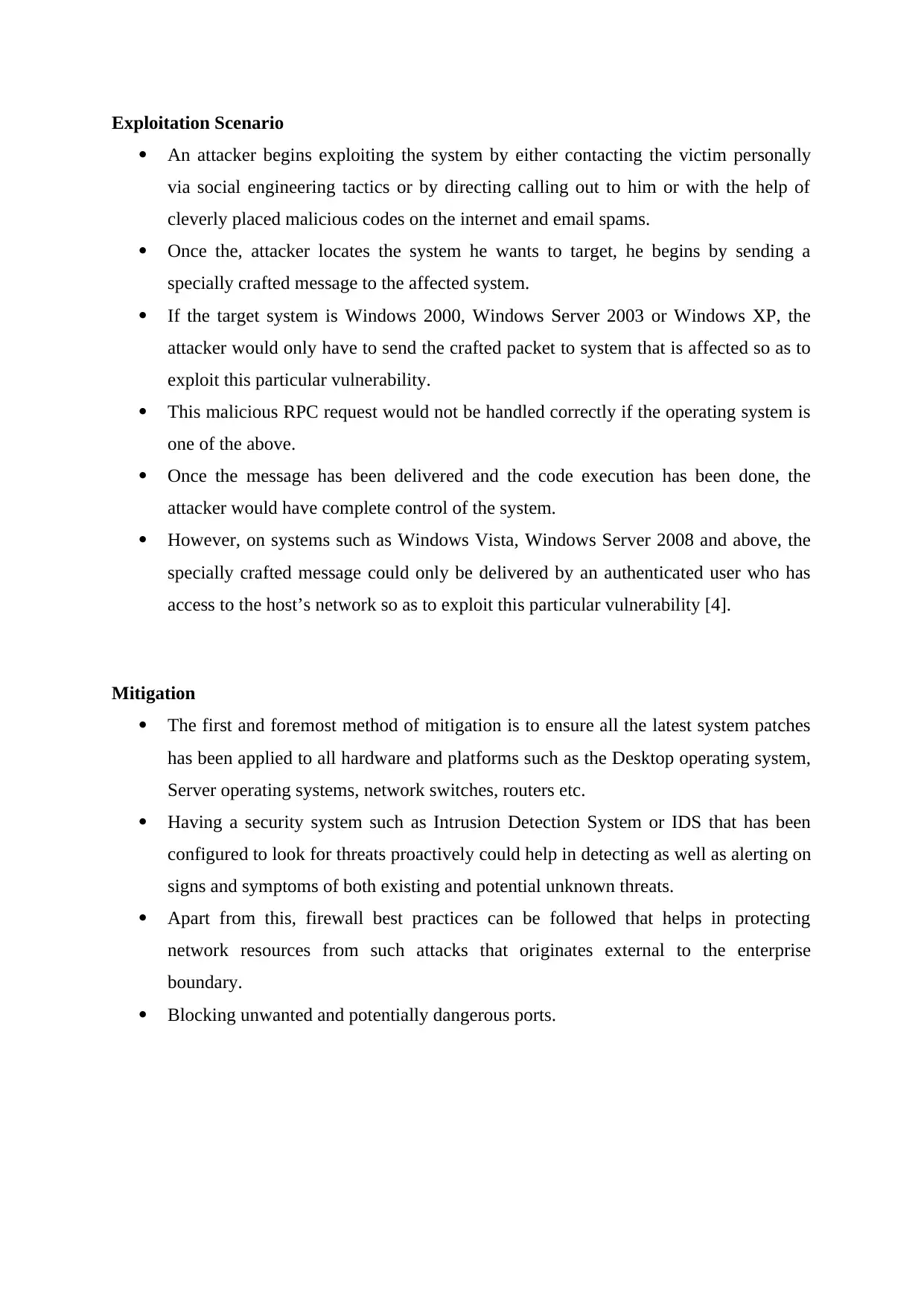
Exploitation Scenario
An attacker begins exploiting the system by either contacting the victim personally
via social engineering tactics or by directing calling out to him or with the help of
cleverly placed malicious codes on the internet and email spams.
Once the, attacker locates the system he wants to target, he begins by sending a
specially crafted message to the affected system.
If the target system is Windows 2000, Windows Server 2003 or Windows XP, the
attacker would only have to send the crafted packet to system that is affected so as to
exploit this particular vulnerability.
This malicious RPC request would not be handled correctly if the operating system is
one of the above.
Once the message has been delivered and the code execution has been done, the
attacker would have complete control of the system.
However, on systems such as Windows Vista, Windows Server 2008 and above, the
specially crafted message could only be delivered by an authenticated user who has
access to the host’s network so as to exploit this particular vulnerability [4].
Mitigation
The first and foremost method of mitigation is to ensure all the latest system patches
has been applied to all hardware and platforms such as the Desktop operating system,
Server operating systems, network switches, routers etc.
Having a security system such as Intrusion Detection System or IDS that has been
configured to look for threats proactively could help in detecting as well as alerting on
signs and symptoms of both existing and potential unknown threats.
Apart from this, firewall best practices can be followed that helps in protecting
network resources from such attacks that originates external to the enterprise
boundary.
Blocking unwanted and potentially dangerous ports.
An attacker begins exploiting the system by either contacting the victim personally
via social engineering tactics or by directing calling out to him or with the help of
cleverly placed malicious codes on the internet and email spams.
Once the, attacker locates the system he wants to target, he begins by sending a
specially crafted message to the affected system.
If the target system is Windows 2000, Windows Server 2003 or Windows XP, the
attacker would only have to send the crafted packet to system that is affected so as to
exploit this particular vulnerability.
This malicious RPC request would not be handled correctly if the operating system is
one of the above.
Once the message has been delivered and the code execution has been done, the
attacker would have complete control of the system.
However, on systems such as Windows Vista, Windows Server 2008 and above, the
specially crafted message could only be delivered by an authenticated user who has
access to the host’s network so as to exploit this particular vulnerability [4].
Mitigation
The first and foremost method of mitigation is to ensure all the latest system patches
has been applied to all hardware and platforms such as the Desktop operating system,
Server operating systems, network switches, routers etc.
Having a security system such as Intrusion Detection System or IDS that has been
configured to look for threats proactively could help in detecting as well as alerting on
signs and symptoms of both existing and potential unknown threats.
Apart from this, firewall best practices can be followed that helps in protecting
network resources from such attacks that originates external to the enterprise
boundary.
Blocking unwanted and potentially dangerous ports.
⊘ This is a preview!⊘
Do you want full access?
Subscribe today to unlock all pages.

Trusted by 1+ million students worldwide
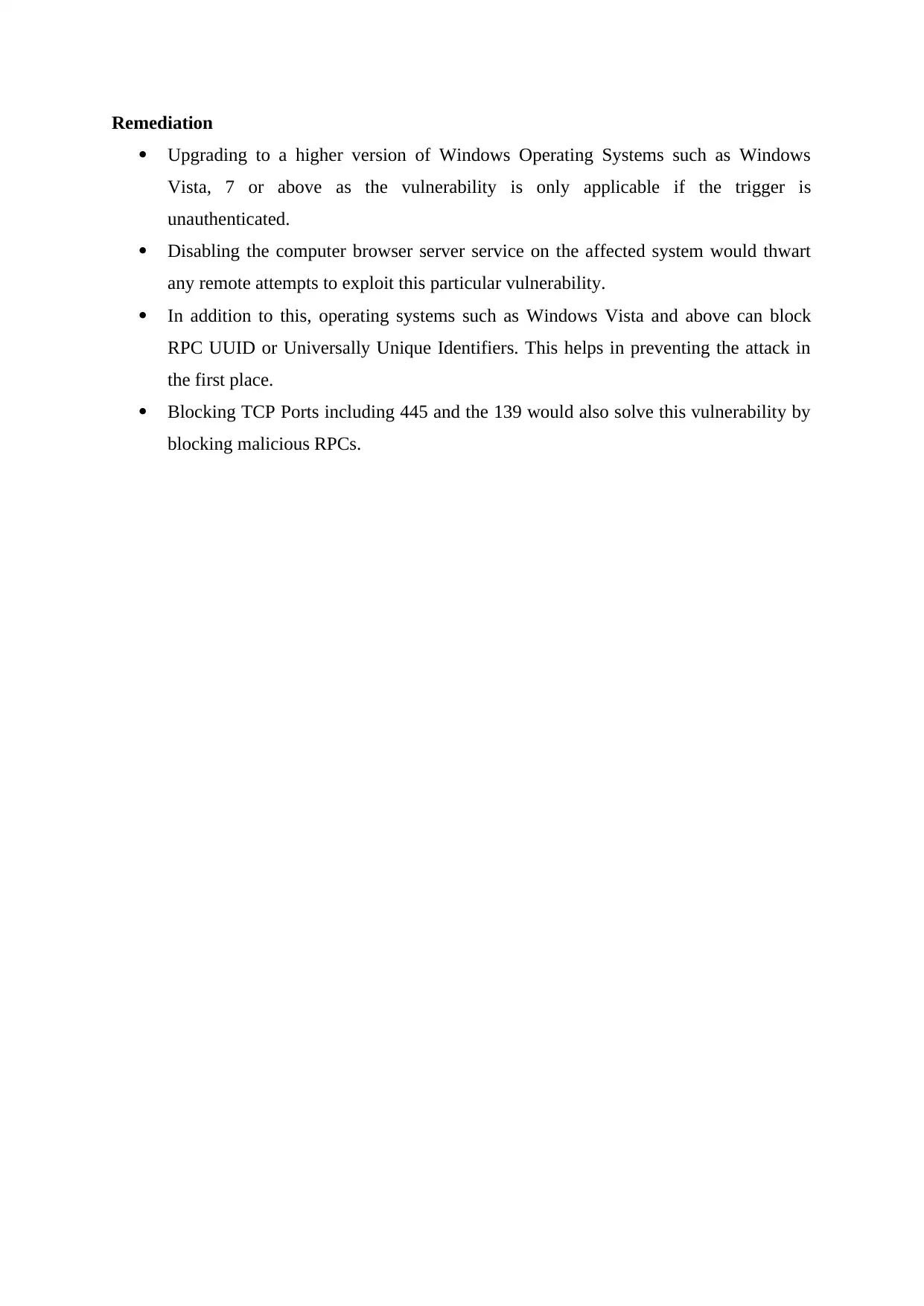
Remediation
Upgrading to a higher version of Windows Operating Systems such as Windows
Vista, 7 or above as the vulnerability is only applicable if the trigger is
unauthenticated.
Disabling the computer browser server service on the affected system would thwart
any remote attempts to exploit this particular vulnerability.
In addition to this, operating systems such as Windows Vista and above can block
RPC UUID or Universally Unique Identifiers. This helps in preventing the attack in
the first place.
Blocking TCP Ports including 445 and the 139 would also solve this vulnerability by
blocking malicious RPCs.
Upgrading to a higher version of Windows Operating Systems such as Windows
Vista, 7 or above as the vulnerability is only applicable if the trigger is
unauthenticated.
Disabling the computer browser server service on the affected system would thwart
any remote attempts to exploit this particular vulnerability.
In addition to this, operating systems such as Windows Vista and above can block
RPC UUID or Universally Unique Identifiers. This helps in preventing the attack in
the first place.
Blocking TCP Ports including 445 and the 139 would also solve this vulnerability by
blocking malicious RPCs.
Paraphrase This Document
Need a fresh take? Get an instant paraphrase of this document with our AI Paraphraser
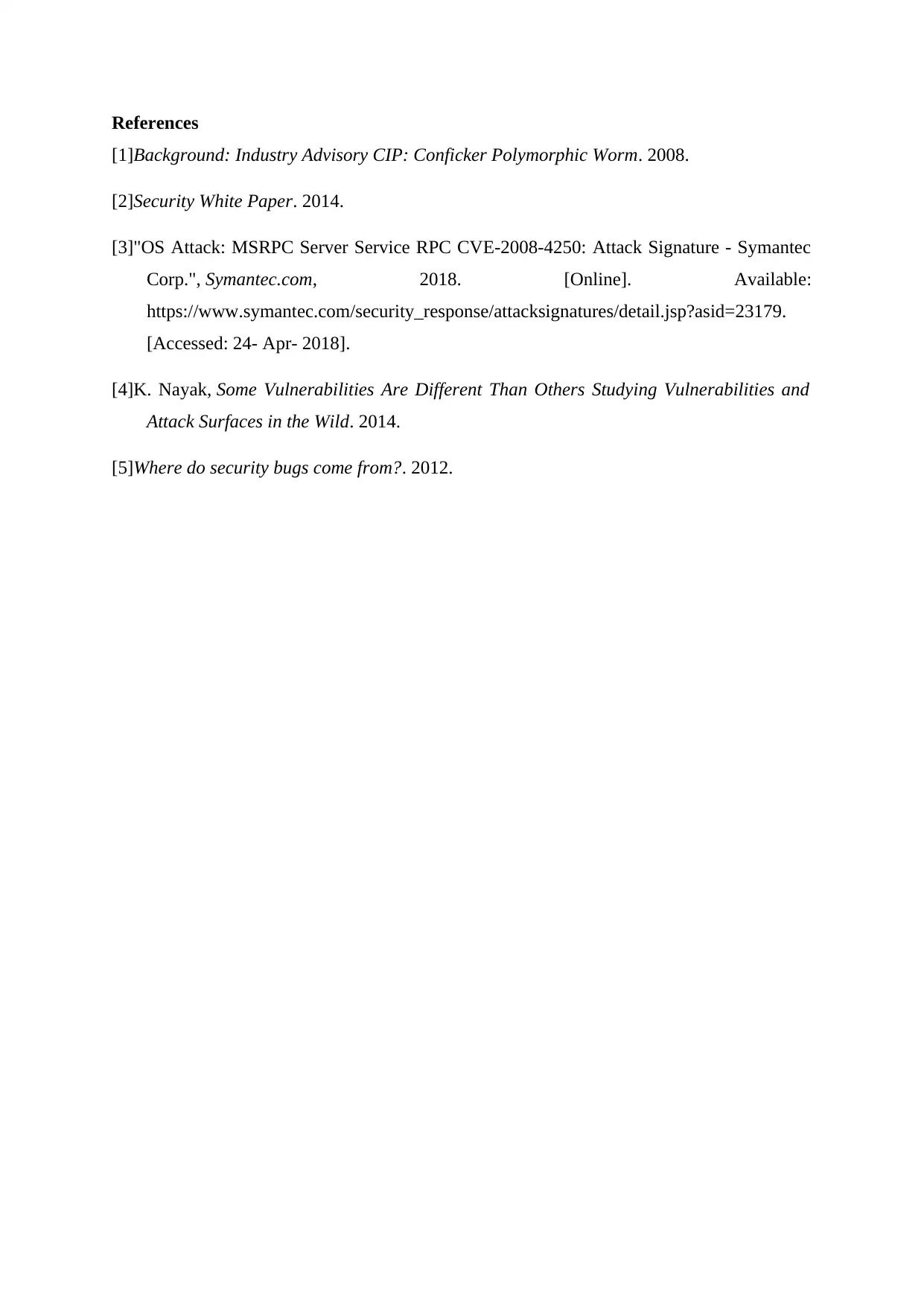
References
[1]Background: Industry Advisory CIP: Conficker Polymorphic Worm. 2008.
[2]Security White Paper. 2014.
[3]"OS Attack: MSRPC Server Service RPC CVE-2008-4250: Attack Signature - Symantec
Corp.", Symantec.com, 2018. [Online]. Available:
https://www.symantec.com/security_response/attacksignatures/detail.jsp?asid=23179.
[Accessed: 24- Apr- 2018].
[4]K. Nayak, Some Vulnerabilities Are Different Than Others Studying Vulnerabilities and
Attack Surfaces in the Wild. 2014.
[5]Where do security bugs come from?. 2012.
[1]Background: Industry Advisory CIP: Conficker Polymorphic Worm. 2008.
[2]Security White Paper. 2014.
[3]"OS Attack: MSRPC Server Service RPC CVE-2008-4250: Attack Signature - Symantec
Corp.", Symantec.com, 2018. [Online]. Available:
https://www.symantec.com/security_response/attacksignatures/detail.jsp?asid=23179.
[Accessed: 24- Apr- 2018].
[4]K. Nayak, Some Vulnerabilities Are Different Than Others Studying Vulnerabilities and
Attack Surfaces in the Wild. 2014.
[5]Where do security bugs come from?. 2012.
1 out of 5
Related Documents
Your All-in-One AI-Powered Toolkit for Academic Success.
+13062052269
info@desklib.com
Available 24*7 on WhatsApp / Email
![[object Object]](/_next/static/media/star-bottom.7253800d.svg)
Unlock your academic potential
Copyright © 2020–2025 A2Z Services. All Rights Reserved. Developed and managed by ZUCOL.





